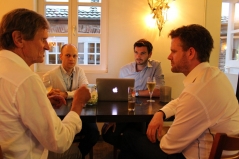Wait, What?! The Stanford Prison Experiment was pre-tested?
Wait, What?! The Stanford Prison Experiment was pre-tested?
With the recent news regarding the questionable nature of the infamous Stanford Prison Experiment, we thought it was purdent to republish one of our earlier blog articles drawing attention to the issue. The piece below appeared on our blog in 2012. A blogpost by the Neurocritic suggests that the infamous Stanford Prison Experiment (SPE) was based on a pre-test in which participants behaved equally cruel. Job van Wolferen summarizes this post and highlights another disturbing point the Neurocritic raises: the... / more
"We are ready to move!" An interview with Daniel Lakens and Klaus Fiedler on the current challenges in the field of psychological research
"We are ready to move!" An interview with Daniel Lakens and Klaus Fiedler on the current challenges in the field of psychological research
Can psychological research still be trusted? In-Mind interviewed Daniel Lakens and Klaus Fiedler-two of the most prominent voices in the debate on how psychological science can be improved. In this interview, they offer a personal view on how psychology has changed and how it should change in the future. They describe their personal motivation and how the debate has affected their own work. Distrust in science is on the rise. Whether it concerns climate change or creationism, politicians such as... / more
Solid science: How graduate students foster research transparency
keywords:
replication, solid science, graduate students
Solid science: How graduate students foster research transparency
Reproducibility is seen as the gold standard for solid science. However, three are few incentive to work transparently, and even less incentives to conduct replication studies. To change this, more and more teachers are assigning replication studies to graduate students as a class assignment. Will this turn early career researchers into witch hunters? / more
Is social psychology ready for the big science revolution?
Is social psychology ready for the big science revolution?
In this blog post, I will describe perhaps the greatest challenge facing social psychology (and other social sciences) in the coming decades: The curation and increased accessibility of research findings. I describe several big science efforts that lead to an eventual goal – a search engine of research findings capable of producing instant empirical summaries and translating findings using lay terms. / more
When science selects for fraud
keywords:
methodology, culture, situationism, evolution, social evolution, fraud, personality
When science selects for fraud
Are fraud and other questionable practices in science caused by a few bad apples, or a culture that rewards based on results, not rigor? In this post, I will argue that our scientific environment is selecting for the wrong kind of scientist. / more
Can you replicate that?

keywords:
replication, solid science, methods
Can you replicate that?
The two previous “Solid Science” posts for this blog have covered important changes taking place in experimental psychology. If you have not read them, I recommend you do. In this post I report on another, larger change occurring in the field : the replication movement. / more
Pre-registration watch part 1: Detecting deception

keywords:
pre-registration, methods, solid science
Pre-registration watch part 1: Detecting deception
In this blog post, I will report on the experiences of social psychologists, such as myself, with committing ourselves to detailed descriptions of the hypotheses and other specifics of experiments before we run them. In part 1, I briefly cover some basics about this so-called pre-registration and then I will discuss my own experience with a pre-registration in the online journal Frontiers about unconscious deception detection. / more
The year the journals changed
The year the journals changed
Where do all the studies come from? Behind every headline trumpeting a new finding in psychology, you can usually find an article in a peer-reviewed psychology journal. But how reliable are these findings? This is what many scientists have recently started to wonder. Because of this, journals in psychology are starting to insist on better reporting of research studies. In this first post of a two-part series, I will explain some of the standards that have typically been used to judge whether a study deserves publication or not. / more
blog categories
- Culture (13)
- Current Events (9)
- Gender (6)
- Meaning Making (7)
- Other (2)
- Political Psychology (11)
- Race & Ethnicity (7)
- Solid Science (8)


